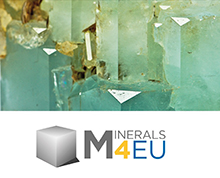The Minerals4EU Project was presented at the Stakeholders Engagement event on Tuesday 11th November 2014, at the offices of the worldwide leading accounting network Grant Thornton UK LLP. The event, aimed at engaging with stakeholders at all stages to steer future project developments, has seen a fruitful private-public debate in the context of exploiting the EU minerals rich endowment. The project, which is designed to meet the recommendations of the EU Raw Materials Initiative (RMI), will produce the most comprehensive and official European Minerals Yearbook as well as a foresight study on raw material supply and demand in Europe. A Raw Materials Knowledge Base will make available harmonized data and information from different EU sources. Sound and relevant data will reduce risks. The initial data will be available through a web portal, free-of-charge, from next January. The event was attended by senior professionals of major companies involved with the mining sector, high level representatives of EU Institutions and the project scientific staff. The feedback of the stakeholders has been positive, with many guests openly welcoming the initiative and showing interest towards the market potential demand. Part of the audience requested to receive further information on this and EC alike initiatives. Also, it was highlighted the need to include in the project data layers containing licence (cadastral) information. This aspect is being addressed by the European Commission and further developments are expected. More information can be found...
How to shape EU Energy Policy so as to boost European Competitiveness?
posted by EuroGeoSurveys
Successful participation of EuroGeoSurveys (EGS) to the High Level Conference on “How to shape EU Energy Policy so as to boost European Competitiveness?” that took place the 17th November 2014 at the European Commission. The EU Energy Union is shaped in such a way as to guarantee, not only security of supply for all consumers, but also stable and affordable energy prices for European businesses. The main political decision-makers and industry CEOs together high-level representatives of national and European institutions, research centers, academics and civil society discussed all the crucial and sensitive components of an EU Energy Union that is able to contribute to boosting European industrial competitiveness: economic, financial and technological conditions required to develop renewable energy and other domestic energy resources in order to reduce European dependence on third-country suppliers; development of infrastructure and internal as well as cross-border interconnections; overhaul of national practices on energy levies, tax components of energy prices and network costs; completion and improvement of the functioning of the EU internal energy market; moderation of energy demand and increase of energy efficiency; adjustment of the EU emissions trading system (ETS); diversification of suppliers and supply routes; etc. In this framework, Mr. Mart van Bracht (EGS President) was invited to explain the situation in Europe on the availability conventional and unconventional fossil fuel resources to reduce EU external dependence and prevent disruptions of energy supply. Mr. Mart van Bracht highlighted that unfortunately there is no detailed pan-European and unambiguous information about sub-surface energy resources, but a really very cautious estimate, based on information and know-how available at present, indicates that reserves of unconventional resources equals the decrease of conventional natural gas reserves and resources in Europe. Europe can still supply a serious part of its energy needs by...


